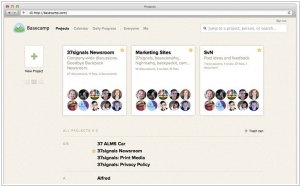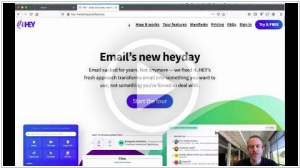Basecamp is #9 in Top 10 Project Management software
Basecamp tackles project management with a focus on communication and collaboration. Making to-do lists and adding to-do items literally just takes seconds. Basecamp is optimized to make the things you do most often really fast and really easy. Basecamp mobile is especially made for popular mobile devices like iPhone and Android.
Positions in ratings
#9 in Top 10 Project Management software
Alternatives
The best alternatives to Basecamp are: Clickup, Asana, Slack, Trello, JIRA, Monday.com, Notion, Microsoft Teams, Smartsheet
Latest news about Basecamp
2020. Basecamp launches Hey, a hosted email service for neat freaks
Project management software maker Basecamp has introduced an innovative hosted email service named Hey. With Hey, the company aims to tackle the chaos and clutter typically associated with traditional email inboxes. One of its notable features is a built-in screener that prompts users to confirm whether they wish to receive emails from new senders. Upon consent, inbound emails are sorted into different trays. The central "imbox" (short for important box) exclusively contains communications designated as important by the user. Newsletters are organized in a News Feed-style tray called The Feed, where they are conveniently displayed in a partially opened format for casual reading. Additionally, email receipts are neatly arranged in a dedicated inbox view called the Paper Trail, serving as a reference for users.
2018. Basecamp adds recurring events and image galleries
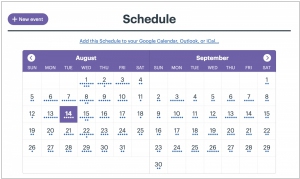
Project management service Basecamp has introduced several exciting new features. The first addition is Recurring events, allowing users to schedule daily, weekly, monthly, and yearly repeating events within Basecamp 3. Users can choose to set the recurrence until a specific date or continue indefinitely. The second feature is Image galleries, which enables users to showcase their work or share photos in visually appealing side-by-side or three-in-a-row layouts. This enhancement makes it easier than ever to present visual content. Lastly, Basecamp introduces Automatic Check-ins, a simple and informal tool extensively utilized for team communication. The entire company can engage in queries such as sharing weekend activities and work updates, while smaller teams like Support can address specific questions related to common issues encountered during the week. These new features enrich the Basecamp experience, enhancing collaboration and streamlining communication within teams.
2018. Basecamp improves client collaboration
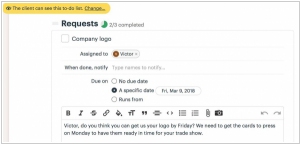
Collaborating with clients in Basecamp has been significantly enhanced, offering an improved experience. The latest updates enable you to effortlessly assign to-dos to clients, share files and folders, schedule events and meetings, engage in Campfire chats, and even automatically ask clients check-in questions. Within a project, all items are now clearly labeled as either "private to our team" or "visible to the client." To avoid any unexpected sharing mishaps and minimize concerns, every item within a project begins as private, accessible only to your team. When you post something new, you have the flexibility to specify whether it should be visible to the client or remain private within your team. These enhancements ensure smoother collaboration and allow for precise control over shared information in Basecamp.
2014. Basecamp app is available for iPad
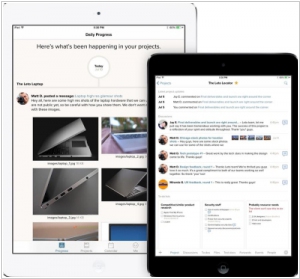
The official app for iPad has been launched by the popular project management service Basecamp, expanding beyond its previous availability only on iPhone and the web for iPad users. This app enables users to conveniently access their projects from anywhere, providing updates on each project's latest news, facilitating participation in discussions and sharing thoughts, and allowing the viewing of team members' progress as they complete tasks and upload files. With all project-related information accessible, users can easily reference documents and make decisions regardless of their location. The app boasts a swift and responsive performance, featuring a clean and well-organized interface.
2014. 37Signals renames to Basecamp, discontinues development of other products
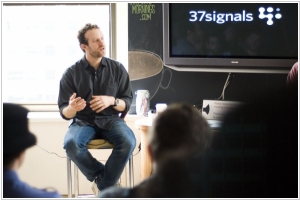
37Signals emerged as one of the pioneers in the SaaS market. In 2004, they introduced Basecamp, a project management service that remains highly popular to this day. It boasts a user base of 15 million individuals and is often regarded as a trailblazer in web-app design. Notably, 37Signals CEO, Jason Fried, is widely recognized, and he has authored books such as Getting Real and ReWork. Jason's profound admiration for small businesses and the startup ethos is evident. Despite Basecamp's remarkable success, he has successfully maintained the startup mentality within the company, employing only 43 individuals. Jason even experimented with scaling back the customer base to control growth. Presently, he has conceived a new idea: to pause the development of other products (including the CRM system Highrise, group chat Campfire, task-manager Ta-Da List, wiki Writeboard, and organizer Backpack) and concentrate all efforts on Basecamp. Moreover, he has decided to rename the company from 37Signals to Basecamp, a concise and elegant title. If you are a user of 37Signals products affected by this decision, there is no need to panic. The products will continue to function and receive support in the future, albeit without further feature updates.
2013. Basecamp launches mobile app for iOS
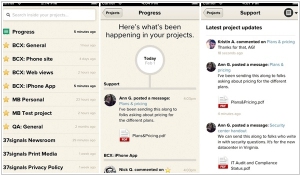
HTML5 has taken a backseat to mobile applications, at least for the time being. Jason Fried, the CEO of the highly popular project management service Basecamp, has always prioritized the effectiveness of his product over following trends or engaging in mere PR stunts. He previously held the belief that focusing on the web interface was the best approach rather than chasing the multitude of mobile platforms. As a result, Basecamp was only available as a web app for mobile devices. However, Jason has recently concluded that a native client would offer greater convenience. As a result, Basecamp is now accessible as a native app for iPhone and iPad. The app is free and showcases the new, visually appealing style of the web version.
2013. Basecamp Personal - SaaS with no monthly charges
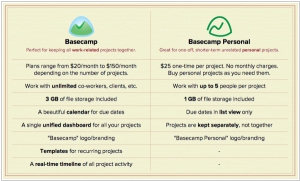
37Signals, the maker of the popular SaaS project management app Basecamp, always invent something interesting and innovative. This time they coming up with the new service Basecamp Personal, intended for small teams (projects), for which the regular Basecamp is too expensive. Earlier Basecamp used to provide a free version for one project and it was very popular. But as you know, 37Signals want to have fewer clients and more money. Therefore, they decided to create a paid version for 1 project and 5 users. But how beautiful they did it... ***
2012. New Basecamp: All ingenious is simple
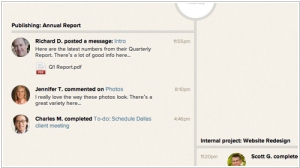
As one of the Enterprise 2.0 classics said: "If I had more time, I would have created a simpler application". That's how 37Signals (the company behind the project management app Basecamp) is spending its time. Basecamp was launched about eight years ago and since then it remained almost unchanged. Every new feature was added only if it was really necessary. Due to this, Basecamp has retained its simplicity and effectiveness. But it turned out that the Basecamp developers during all these years not only defended the app from the complications, but also have been inventing more perfect and simple structure. And this year they decided to roll it out. It's hard to believe, but the new version of Basecamp is even easier and more effective. ***
2010. 37signals Suite - the new rival for Google Apps

37Signals has introduced a bundled package of its key SaaS services for businesses called 37signals Suite, similar to how Google offers its services as Google Apps. The suite includes Basecamp (a project management system), Highrise (a CRM system), Campfire (a group chat platform that can serve as a communication tool within this package), and Backpack (a group organizer with wiki functionality, which can be seen as an intranet portal within this bundle). Currently, the integration between these applications may not be seamless, but it provides a unified user base. The pricing of 37signals Suite is designed to make it more cost-effective to purchase the entire suite rather than individual services in most cases. The price starts at $99 per month and includes 35GB of storage, 35 projects in Basecamp, 20,000 contacts in Highrise, 5,000 pages in Backpack, and 50 simultaneous chats in Campfire. While the price may appear higher compared to the cost of Google Apps ($50/year), it's important to note that Google charges this fee per user, whereas 37Signals Suite offers unlimited users.
2010. Jason Fried: We want fewer customers. Basecamp increased prices (sort of)

Let's start from what happened last week. Without any announcements 37Signals dropped a low end plan from the Basecamp sign-up page ($24/month for 15 projects and 5GB of disk space). Now, the cheapest option on this page is $49 for 35 projects and 15 GB. Of course, this caused a loud reaction of bloggers and competitors. Bloggers started speculating that Basecamp feels so confident that has lost interest in small business. Competitors started pitching alternative project management tools and Zoho even pushed the promotion for customers switching from Basecamp to Zoho Projects. 37Signals co-founder Jason Fried has clarified the situation. "In fact, Basecamp hasn't raised prices. Existing users continue to pay the same price for the same subscription plans. The company is just experimenting with the sign-up page design. The $24 plan is still available (inside) for those who sign-up for free account and then wants to upgrade". Nevertheless, the idea of the experiment is clear: Basecamp focuses on the more "expensive" clients. Here's why: ***
2010. Jason Fried: Why modern workplaces don’t work
Jason Fried, 37Signals co-founder, exactly knows how to create beautiful systems. Basecamp users and Ruby on Rails developers know this. Recently he published the video with his vision of how to create a beautiful workspace (on the example of 37Signals) and how online tools can help. Jason started with the fact that in most companies collaboration is organized absolutely wrong. It's based on the constant interruptions. Employee just turns on the computer, and the interruptions begin: instant messages, email notifications, phone calls and of course, co-workers that come and ask something. No one can work productively in such environment. And, often collaboration software (especially messengers and microblogs) doesn't help to mute this noise, but increase it. ***
2009. 37Signals becomes the richest SaaS company

37Signals, the developer of online project management service Basecamp, according to the recent investment round, has become the most expensive company in the Internet services market. The group of investors, led by Yardstick Capital and Institutionalized Venture Partners purchased 0.000000001% of the company for $1. So, the potential 37Signals' market price has increased to about $100 billions. This was officially announced in the company blog. During the company-wide meeting, dedicated to this event, Jason Fried (37Signals founder), announced, that all SaaS applications, developed by 37Signals, including Basecamp, will become free in order to attract more users and to reach the estimated userbase already in 2013. ***
2008. When The Browser Doesn't Cut it: Basecamp's Lack of Mobility
Basecamp has revolutionized the productivity of small, geographically dispersed teams, making it possible for virtual companies to thrive. However, there is a significant challenge: Basecamp is browser-based, and many users, including ReadWriteWeb's VP of Content Dev Marshall Kirkpatrick, desire a mobile-native experience. The lack of a mobile version poses difficulties, particularly for those who rely on their mobile devices for communication while on the move. The current solution involves accessing Basecamp through a mobile browser, which is cumbersome and inconvenient. The ideal scenario would involve a native mobile interface, similar to Twitterberry for Blackberry users. However, this issue goes beyond incremental change; it requires a fundamental shift, akin to the transition from client-server to browser-based applications. Browsing on small mobile screens is akin to early TV talking heads. Solving this problem is challenging, as it involves creating a mobile-native user interface, enabling offline syncing, and accommodating a wide range of mobile devices. Additionally, the user-centric approach, as opposed to a project-centric one, and collaborative list building are significant aspects that need to be addressed. The ultimate solution would require a user interface maestro, either as an extension to Basecamp or a new service altogether, that can overcome these challenges and provide a seamless mobile experience. While a native Blackberry interface for Basecamp would be a short-term fix, a more comprehensive solution is necessary. It's worth exploring alternatives to Basecamp in this increasingly mobile-driven work environment and considering whether Basecamp remains the best project management solution.
2008. 37signals’ Backpack: Now iPhone-Sized
Updatable, a design firm based in Jacksonville, Florida, has released FrontPocket, an iPhone application that serves as a mobile companion to 37signals' Backpack service, which helps with business organization and data sharing. FrontPocket stays true to the simplicity and minimalism that define Backpack and its related tools. The design is straightforward, with only basic features commonly found in iPhone apps and a limited color palette. While aesthetics may not be the main focus, FrontPocket excels in providing access to information and seamless management between desktop and mobile environments. Its capabilities are limited to creating and managing lists, pages, calendars, and journal entries, excluding file uploads. However, this is reasonable given the mobile nature of the iPhone. Whether you have a paid subscription or a free account with 37signals, FrontPocket can be used effectively. It is not meant to replace or replicate the full functionality of its desktop counterpart. Keep in mind that access to the calendaring service requires a monthly payment to 37signals, regardless of whether you use FrontPocket or not. Overall, FrontPocket proves to be a useful tool, especially for avid Backpack users who desire constant access to their data. Although there may be some technical issues with the initial release, the developers are actively addressing them. If you're a dedicated Backpack user longing for a portable version, FrontPocket is likely to meet your expectations and enhance your productivity.
2008. In Copper Project, Basecamp Has Some Competition
Copper Project is a recently launched web-based tool designed for project management and collaboration, allowing users to share projects, tasks, files, contacts, and events at any time and from anywhere. It offers teams the ability to create comprehensive project plans and track progress, while providing access to staff, clients, and subcontractors who can actively contribute to the project. Notable features of Copper Project include a user-friendly interface with drag-and-drop timelines, email alerts, and the option to import MS Project MFL files. Despite its simplicity, even individuals with basic project management knowledge can easily navigate the platform. Noteworthy clients of Copper Project include Coca Cola, Pennsylvania State University, OgilvyOne Worldwide, Ignition Interactive, and the Royal Surf Lifesaving Association. The tool is available as a hosted service or as a client-hosted download, with pricing plans ranging from $9 per month for personal use to $199 per month for enterprise licenses. Additionally, downloads are available at prices ranging from $499 to $2999. Although Copper Project may not compete with Basecamp in terms of attracting early adopters who previously used the free version of Basecamp, it presents a robust alternative as an enterprise project management solution.
2008. 37signals Backpack Organizer Now Offers Options for Groups
37signals has released an update for its Backpack data organization tool, expanding its functionality beyond personal management to accommodate group collaboration. Marketed as a reinvention of the intranet, the new Backpack offers an intranet solution that colleagues and associates would genuinely find useful. The software, known for its simplicity and intuitive interface, now allows users to collaborate and engage in group-oriented tasks. In an era focused on social business, it is a logical step for 37signals to enhance Backpack's capabilities and make it multiplayer, aligning it with their other successful software offerings. While some may consider the software too basic, it effectively eliminates unnecessary features and provides a streamlined experience for users who prefer efficiency over complexity. Prior to the update, Backpack boasted a user base of 300,000 individuals, and within the first 24 hours of the new launch, the product saw significant traction with 317 paid upgrades and 61 new paid registrations, as reported on the company's Signal vs. Noise blog.
2007. 37Signals Releases Backpack Update
37Signals has introduced an upgraded version of its Backpack service, a platform designed for file and note organization. The latest release includes a revamped user interface, with a cleaner toolbar now positioned at the top of the pages. Users can conveniently drag and drop items across different pages. The search functionality in Backpack has also been enhanced, enabling comprehensive searches across all Backpage pages. New page dividers have been introduced to promote better organization of items and files, with the option to label each page divider. Additionally, multiple photo galleries per page and RSS feeds for shared pages have been added, facilitating seamless updates within collaborative groups. In other news from 37Signals, Highrise, a collaboration tool, was launched earlier this year, complementing the suite of online tools offered by 37Signals.
2007. Alternatives to Basecamp for Project Management
Basecamp, a widely known and used online project and team management web app, has received criticism and complaints from users who feel it falls short of meeting their team's needs. Users like Rashmi Sinha, Emily Chang, and Douglas Karr have expressed frustrations with various aspects of Basecamp, such as its lack of integration with other tools and its inflexibility in certain areas. While Basecamp offers features like to-do lists, messages, milestones, collaborative documents, chat, time tracking, and a shared file repository, it is sometimes considered too rigid and lacking in terms of search capabilities, tagging, and sub-categories. As an alternative, there are other options available in the form of online project management apps like Goplan, Lighthouse, activeCollab, and Jira, which provide structured data and predefined processes. Wikis, such as PBWiki, Wetpaint, and Wikispaces, offer excellent knowledge capture capabilities but may not provide extensive support for task management and scheduling. Another approach is using an online office suite like Gmail, Google Calendar, and Google Docs & Spreadsheets, which can be customized to suit your project needs but require additional development for advanced features. Alternatively, one can create a custom solution by combining different tools like Stikkit, Zoho, and Box.net, tailoring it to their specific requirements. Ultimately, the choice depends on the nature of the work, team dynamics, and project variables, and it's essential to explore different options to enhance virtual team productivity.
2007. Freshen Up Your Invoicing with Basecamp-Freshbooks Integration
FreshBooks, the online invoicing and time tracking tool, has recently announced its integration with Basecamp, providing a fresh and improved invoicing experience for Basecamp users. With this integration, users can now directly invoice their projects through their FreshBooks account, leading to increased productivity. FreshBooks has carefully selected two workflow scenarios that cater to the needs of 80% of users. The first integration allows users to generate invoices based on time entries or To-Do lists. The second integration enables Basecamp projects to seamlessly transition into FreshBooks projects, with Basecamp's To-Dos becoming tasks in FreshBooks. This integration promises to expedite the invoicing process and streamline invoicing tasks for Basecamp users. Setting up the integration through the user-friendly FreshBooks interface appears to be a straightforward process.
2006. 37signals Takes Investment from Jeff Bezos - Sellout?
37signals, renowned for their collaborative software like Basecamp and Backpack, has recently announced an investment from Bezos Expeditions, a personal investment company of Amazon founder Jeff Bezos. While some may wonder why they would seek external funding, considering their profitable ebook sales and successful products, it becomes evident that it's not solely about the money. 37signals' philosophy centers around maintaining a small and independent identity. The motive behind this investment is to gain access to Bezos' experience and expertise, propelling the company to the next level. By offering a stake in their future, they can tap into Bezos' knowledge, which goes beyond mere financial and networking benefits. Although this move may cause some controversy among their devoted following, I believe it is a strategic and necessary step for their growth.
2006. Campfire Goes Live
Campfire, developed by 37Signals, the creators of Basecamp, is a new web-based chat service that boasts simplicity, intuitiveness, and an appealing design. It specifically caters to the needs of small businesses, offering a centralized platform to store all chat conversations (with permalinks provided). Notably, Campfire allows users to conveniently insert images directly into the chat window, adding a nice touch to the experience. While its usefulness for one-to-one chat may be slightly better than traditional instant messaging clients, its true strength lies in facilitating multi-person chats. It effectively addresses the challenges associated with organizing group chats and the lack of a centralized storage solution. An essential feature of Campfire is that every chat has its own permanent URL, eliminating the need for specialized chat software or networks. Additionally, users can effortlessly share and discuss files with colleagues or clients, search and browse through past chat transcripts, and enjoy secure SSL-encrypted communication (available with the Plus and Premium plans).

